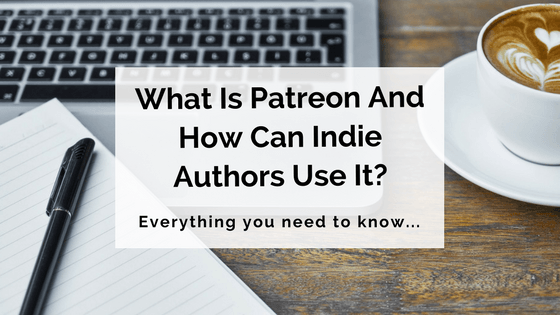If you’ve been on the internet at all over the past few years, you’ve probably heard of Patreon. Inspired, as the name suggests, by the old-world concept of artistic patronage, Patreon is growing every day as an alternative income method for creators.

But how exactly does Patreon work? And how can indie authors use it to bolster their writing income?
Let’s take a closer look at this platform, the ways in which it can be beneficial for indie authors, and the caveats you need to keep in mind if you use it.
What is Patreon and how does it work?
Put simply, Patreon is a membership platform that allows people to pledge money to support all kinds of creators: writers, artists, podcasters, YouTubers, musicians…
Basically, if you create anything, you can make a Patreon page and invite people to make a monetary contribution to your work.
Your fans (or ‘patrons’) pay a regular subscription amount of their choosing, and in return, you provide them with content (or ‘rewards’). You can make different subscription levels available, usually starting as low as $1 per month; the higher the subscription level, the more substantial the rewards.
Your page can be set up for per month subscriptions – meaning your patrons contribute a monthly amount and receive monthly rewards – or per creation, which means patrons pay a set amount for each reward (such as a short story).
You can also set optional ‘goals’, which are funding checkpoints that detail what you’ll be able to achieve after reaching that particular monetary milestone.
Now that we’ve covered the basics of how Patreon works, let’s take a look at how it can be utilised by indie authors specifically.

How can indie authors use Patreon?
For indie authors, a Patreon account can be used to supplement writing income. However, it’s important not to confuse Patreon with other crowdfunding platforms such as Kickstarter and GoFundMe, which some authors use to fund entire publishing projects.
We don’t recommend using Patreon in this way (i.e. to get people to pledge money to you specifically to cover costs of publication such as editing, cover design and so on). That’s not what this platform was intended for, and we don’t believe crowdfunding is a strategy indie authors should use for their publishing career.
So how should you use Patreon as an indie author?
Let’s first take a look at how other authors are using it.
If you scroll through the top creators in Patreon’s Writing section, you’ll find people creating translations, original works of fiction, comics, newsletters and blog posts. Only a few in this ‘top’ list are authors, but there are plenty of indie authors to be found on the platform, many of whom are using it to great success.
Check out a few to get an idea of how and what they’re using it for:
Traditionally published authors are using Patreon, too. Acclaimed SFF author N. K. Jemisin currently has over 1300 patrons, adding up to more than $5700 per month. Jemisin started her Patreon page in order to be able to quit her day job and work full-time on her fiction, and succeeded; she now continues to use it to supplement her writing income.
Similarly, award-winning author Seanan McGuire currently has around 2000 patrons. Her account doesn’t operate on a monthly model; rather, backers pledge an amount per short story McGuire releases – and with the amount of backers and different levels she has, this currently adds up to over $10,000 pledged per story.
Other traditionally published authors using Patreon include Marie Brennan, Kameron Hurley and Catherynne M. Valente.
Now, these last few examples aren’t really the norm when it comes to Patreon, particularly for smaller-scale indie authors. But they do demonstrate that readers can be willing to support authors in other ways than simply purchasing their books.

Patreon rewards
Let’s now delve into the kinds of things you can offer your subscribers in return for their patronage.
Once you’ve set up your Patreon account, it’s time to decide what sort of rewards you’re going to provide. Your rewards will inform how much you charge at each subscription level, and it’s really up to you to decide what you’ll offer and for how much.
Here are some ideas for rewards you might like to offer, broken into two categories: book-related and non-book-related.
Book-related bonuses
Obviously, the most popular kinds of rewards indie authors can offer their readers are those related to their books. There are all kinds of bonus content offerings you can provide to complement your actual books, such as:
- Short stories. Whether it’s a prequel or simply a short piece set in the world of your books, a short story is a great reward. (Plus, there are many reasons novelists should write short stories – flexing your writing muscles and refreshing your creativity, to name just a couple!)
- Deleted scenes. Got a scene that you loved but eventually had to cut from the final book? Why not share it exclusively with your Patreon subscribers?
- Sneak peeks. Reward your patrons with exclusive early access to things like title and cover reveals, blurbs and excerpts from your new books.
- Input into books. Let your readers contribute to your work by, say, naming a character or place. What could be more exciting than having actual input into one of your favourite author’s novels?!
- Name in Acknowledgements. Show your appreciation for your loyal, top-tier patrons by acknowledging them by name in the Acknowledgements section of your next book.

Non-book-related bonuses
In addition to all the above reward ideas, you can also offer different types of bonuses that aren’t necessarily directly related to your books. Consider things like:
- Videos. If you don’t already have a ‘booktube’ or author YouTube channel, consider making some short videos that are available exclusively to your Patreon subscribers. Your videos can be on any topic, provided it offers some value or entertainment to your patrons. Perhaps you might like to create a behind-the-scenes video of your typical writing day, talk about the craft of writing, or simply share some insight into your latest project.
- Podcasts. If you’re not too comfortable in front of a camera, why not try some short podcast-style recordings instead?
- Q&A sessions. Open up your Patreon page to questions from subscribers about your books, writing process, life – anything you like.
- One-on-one communication or service. This sort of reward takes up a lot of your time and effort, so should be for top-level subscribers only. (More below on spending your time wisely on Patreon reward creation.) It could be something like a one-on-one online chat, or a service such as feedback on a piece of writing from a subscriber.

Some caveats to keep in mind
Now that we’ve discussed the ways indie authors can use Patreon, it’s time to talk about some things you should be wary of.
Yes, Patreon can be a great way to supplement your income as an indie author. But there are certain caveats you need to keep in mind if you’re considering dedicating time to establishing a Patreon platform.
Here are a few of our primary cautions.
Don’t rely on Patreon for the majority of your author income
The key thing to remember about Patreon is that it should be treated as a supplementary form of income only.
You shouldn’t rely on income from your Patreon to replace that earned by your books or your day job. If your Patreon income gets to the stage where it enables you to live comfortably as a full-time writer without your day job, then great; but try not to go into it expecting this from the get-go, as it may not ever happen, and will take a while if it does.
As a self-published author, your earning potential is entirely in your own hands. This means that the more books you can write, the better quality you can make them, and the better you can market and promote them, the more money you can make.
However, it also means that creating and selling books needs to be your main focus, as it’s your main source of income. Patreon can supplement your overall author income, but should never be relied upon to make up the majority of it.

Don’t let Patreon reward creation eat into your actual writing time
Once you start a Patreon and begin creating fun rewards for your subscribers, it can be easy to get carried away and start spending more and more time on all that bonus content. But when this starts to cut into the time you spend actually writing your books, you’ve got a problem.
As an indie author, your primary focus should be writing your books. As we discussed above, they’re your primary product and your main source of income; producing them should be top of your priority list at all times.
Your book marketing shouldn’t take a back seat to Patreon, either. It should take a very close second place to actual writing in terms of prioritising your time as an indie author.
While maintaining your Patreon can help supplement your income, you still need to focus on coming up with fresh ideas for promoting your book and consistently driving your marketing strategy – as well as actually writing.
Don’t expect all of your readers to support you on Patreon
Just because someone reads and likes your books, it doesn’t mean they’ll be interested in pledging further financial support to you on Patreon – and that’s totally fine.
Many readers will only wish to support you as an author by directly purchasing your books. Be grateful for this, and don’t be disappointed if they don’t pledge to you on Patreon as well – and certainly don’t pester them to do so.
One problem many people may have with indie authors using Patreon is the notion that these authors are looking for some sort of handout. As author Kate Aaron puts it in her discussion of the controversy Patreon sometimes provokes:
Patronage, and Patreon in particular, can make it seem like the artist is expecting something for nothing. If you can produce the work and sell enough copies to make a living, why do you need Patreons? And if you can’t produce, or the work doesn’t earn enough, why do you expect other people with their own bills to pay to add yours to their burden? … This is a valid criticism [of the platform].”
However, if you use Patreon the right way – providing valid rewards in return for your readers’ voluntary support, and never expecting or demanding patronage from any of your readers – we believe it’s a fair and viable way to sustain and complement your income as a writer.

Remember the fees involved with having a Patreon account
While the fees involved in having a Patreon account are fairly minimal, they do exist. Patreon’s current fee model states:
You keep 90%; we keep 5%; transaction fees average 5%.”
This doesn’t take into account the conversion from US dollars into other currencies, so bear that in mind as well if you’re in a country other than the US.
***
So there you have it! Our wrap-up of Patreon as a potential supplementary income platform for indie authors.
Do you have a Patreon account to support your income as an author? Share your experiences and thoughts with us below!
9 responses to “What Is Patreon And How Can Indie Authors Use It?”
I liked the article and thanks for posting it.
You’re welcome, Vijay! Glad to hear you enjoyed it.
-Claire
I’ve just started my Patreon, and I can’t find any information on ‘setting up a Q&A’ – do you mean starting an ‘Ask me anything’ message thread in the Messages tab?
It’s not the cleanest of platforms for finding information. Most of what’s there I’ve stumbled across by accident.
Thanks for the tips. I have this feeling the first month is critical, but can’t find anything they do to spotlight beginners. One patron is not enough.
Hi Alicia,
Thanks for stopping by!
As far as I know, Patreon doesn’t have a specific function for Q&As – we meant that as basically setting up your own, in any form you choose (e.g. opening up to questions through messages, as you suggested, then perhaps posting the answers in your Posts feed).
Agreed that it can be difficult for people starting out on Patreon, but keep trying to build up those patrons and see how you go! It isn’t for everyone, so if you find that it ends up not being worth it, at least you’ve given it a try.
Best of luck! 🙂
A very clean and concise article. I am considering setting up an account and doing mostly Short Stories with an occasional long running Novel in a series with a character and story premise that I created some years ago. Mystery/Thriller for the Novel and Weird/Bizarre Short Stories…nothing new necessarily other than my old school story telling style and knack for creating the visual haha I believe I may give it a go once I’ve reviewed some of their latest controversy news etc. Would you happen to have a couple alternatives to check out before I dedicate?
Peace to you and yours and Thanks for the article.
R.A. Moore
Great article. Quite on point. Thank you!
Excellent, informative article!
Great food for thought. Good insights. I appreciate you sharing these ideas.
Thanks so much, Richard. Glad you found the article helpful 🙂